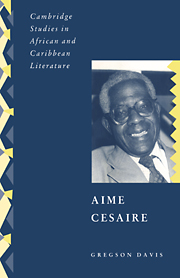Book contents
- Frontmatter
- Contents
- Preface
- Acknowledgements
- Chronology
- Introduction
- 1 From island to metropolis: the making of a poet
- 2 Exploring racial selves: “Journal of a Homecoming”
- 3 Inventing a lyric voice: the forging of “Miracle Weapons”
- 4 Lyric registers: from “Sun Cut Throat” to “Cadaster”
- 5 The turn to poetic drama
- 6 The return to lyric: “me, laminaria …”
- Epilogue
- Notes
- Bibliography
- Index
2 - Exploring racial selves: “Journal of a Homecoming”
Published online by Cambridge University Press: 29 October 2009
- Frontmatter
- Contents
- Preface
- Acknowledgements
- Chronology
- Introduction
- 1 From island to metropolis: the making of a poet
- 2 Exploring racial selves: “Journal of a Homecoming”
- 3 Inventing a lyric voice: the forging of “Miracle Weapons”
- 4 Lyric registers: from “Sun Cut Throat” to “Cadaster”
- 5 The turn to poetic drama
- 6 The return to lyric: “me, laminaria …”
- Epilogue
- Notes
- Bibliography
- Index
Summary
There is no predetermined négritude; there is no essence; there is only history–a living history
Aimé CésaireThe notion of a “definitive text” belongs to religion or perhaps merely to exhaustion.
Jorge Luis BorgesCésaire's first published poem, “Journal of a Homecoming” (Cahier d'un retour au pays natal), has also remained his best known. Several facets of this “greatest lyric monument of our time,” as Andre Breton famously styled it, make it unique within the Césairean poetic corpus. By virtue of its length alone (it occupies approximately 50 pages in the Maximin-Carpentier edition) it stands apart from the rest of the author's lyric output, which otherwise manifests a pronounced partiality for the short poem. Despite its length and broad thematic sweep, however, it is manifestly the poet's most accessible and, not surprisingly, most quoted, translated and anthologized opus. Its relative accessibility, as compared with most of Césaire's subsequent poetry, is due in part to the youthful author's explicit desire to play the role of major spokesman for the black world. So ambitious a role obviously requires a certain straightforwardness in the coding of the “message,” and indeed Césaire, while forging the densely metaphorical style that is his signature, spectacularly succeeds, in the pages of Cahier, in creating a sustained lyric prose-poem whose basic “message” is fairly transparent to the careful reader.
Cahier is fundamental to Césaire's œuvre from more than one crucial vantage-point. Nothing symbolizes the poem's foundational status more strikingly than the story of its many metamorphoses in print.
- Type
- Chapter
- Information
- Aimé Césaire , pp. 20 - 61Publisher: Cambridge University PressPrint publication year: 1997



